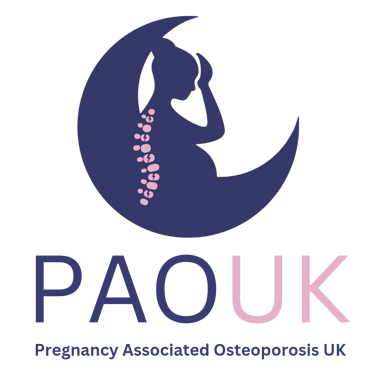Management
What management options are currently available?
PAO is rare. Therefore, urgent referral to a NHS Specialist Bone Clinic with PAO experience is essential. This will help co-ordinate individualised assessment (eg. identification of additional underlying causes through blood tests, etc.) and care, while ensuring up-to-date advice on treatment options.
The Specialist Bone Clinic is typically run by rheumatologists or endocrinologists and can co-ordinate with a range of other healthcare professionals, including but not limited to:
GP to be kept informed of specialist care.
Radiologists, Neurosurgeons and Orthopaedic specialists for assessment of fractures.
Pain specialists for advice and management of severe or prolonged pain.
Physiotherapist with experience in osteoporosis, ante/postnatal care and knowledge of PAO for help with pain and advice on appropriate rest, movement, functional activities and exercises.
Occupational therapists for advice, equipment and aids to make life easier while fractures heal and pain is reduced.
Dietician to optimise nutrition to support bone health.
Health visitor and/or breastfeeding specialist for advice on cessation of breastfeeding, often recommended by specialist bone clinicians to minimise ongoing bone loss, and which is normally required prior to starting any bone treatment.
Important! Breastfeeding is very personal and the timing of stopping breast-feeding requires shared decision-making with PAO mothers.


Important! In the UK, doctors with specialist experience in PAO should assess and determine whether to allow women’s bones to heal naturally or to prescribe Osteoporosis-specific medications.
What is the treatment protocol?
Currently, there are no standard management or treatment guidelines for PAO.
Clinicians will usually recommend optimising calcium and/or vitamin D3 intake through diet and/or supplements to support bone health.
Although bone density is known to improve naturally and to varying degrees once pregnancy and lactation are completed, there are treatments that may aid and enhance bone recovery in the context of PAO.
Certain Osteoporosis-specific medications may be recommended in certain cases and under NHS Specialist Bone Clinics.
While Osteoporosis medications are not currently licensed for premenopausal women, treatment can be accessed on the NHS if clinicians deem it indicated:
Scotland: specialists can prescribe medications.
England: clinicians can make a specialist funding application to access treatment. Note: Approvals can take several months.
Treatments can also be accessed through private clinicians with PAO experience, typically consultant rheumatologists. Some private health insurance providers cover this expense.


What is the prognosis?
Quality of life often improves with time for women with PAO, but for some, it may never fully return to normal.
Bone mineral density (BMD) may remain lower than average in women diagnosed with PAO, although it does improve naturally over time and to varying degrees once pregnancy and breastfeeding have finished.
Researchers are still investigating the degree to which drug treatments impact long-term bone density outcomes in women with PAO.
Many women with PAO, especially those with multiple vertebral fractures, may continue to experience pain or discomfort, even after BMD improvement. This may be attributable to mechanical changes in the spine, nerve compression, or chronic musculoskeletal strain.
Physiotherapy can help to improve posture, but height loss and/or kyphosis often persist to varying degrees.
Some women do go on to experience further fractures following their PAO diagnosis; overall, this risk is estimated to be around 1 in 8, and may be higher in women who have had more fractures in the past.
As this is a rare bone condition, women with PAO should remain under ongoing specialist care and/or oversight.
Close monitoring is especially important in both perimenopause and menopause.
Clinicians may suggest Hormone Replacement Therapy (HRT) to help prevent menopause-associated bone loss.




Can women with PAO have subsequent pregnancies?
Many women diagnosed with PAO who wish to extend their families go on to have further successful pregnancies.
However, there is a risk of fractures in subsequent pregnancies.
Overall, this appears to occur in about 12% of women with a previous PAO diagnosis.
Risk likely varies significantly, depending on the severity of their PAO and the extent of a woman’s recovery.
Important! Women diagnosed with PAO who are planning to become pregnant again should be under the care of a specialist (e.g. rheumatologist, endocrinologist or maternal medicine physician) to discuss individualised risks and mitigations.
